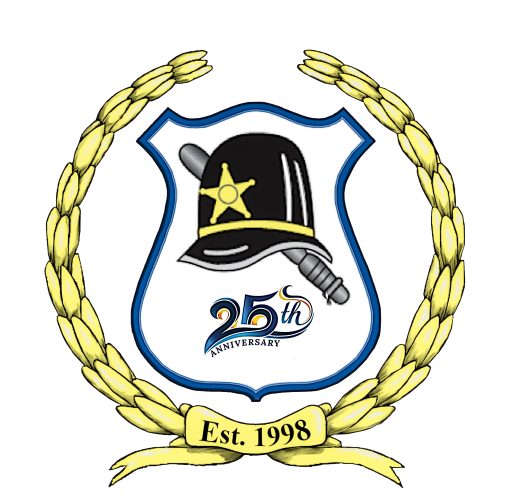0:00

The Greater Cincinnati Police Museum
“Preserving the History of Law Enforcement in the Greater Cincinnati Area”
|
Cincinnati Police Department History – 1800 to 1824
|
|||||||
|---|---|---|---|---|---|---|---|
|
1800
|
–
|
–
|
Population – County – 14,692 |
–
|
|||
|
1800
|
–
|
–
|
Population – City – 750 |
2
|
|||
|
1802
|
1-Jan
|
–
|
Territorial Legislature, while meeting in the capitol of the Northwest Territory, Chillicothe, passed an Act incorporating the village of Cincinnati. Act provided for the village officials and defined their powers and duties; president, recorder, assessor, tax collector, marshal, and a council of seven trustees to be elected by popular vote. |
1, 5
|
|||
|
1802
|
–
|
–
|
Population – City – 800 |
–
|
|||
|
1802
|
–
|
–
|
Marshal established, by ordinance, to “execute all writs, warrants, summons, and other precepts that may be directed to him by the Council…” |
1
|
|||
|
1802
|
–
|
Smith, Marshal James
|
Appointed Village Marshal |
4
|
|||
|
1803
|
29-Mar
|
–
|
Night Watch established, by ordinance, after disastrous fire. All males over 21 divided into groups of 12, one of whom was chosen as a captain. Two groups would serve alternatingly taking the east and west sides of town. They carried rattles and large perforated lanterns. They were charged to walk “to and fro through the streets therefore in a quiet, peaceable manner; and it shall be their duty to apprehend and take into their custody and safe keeping all and every person or persons they may detect during the night in any felonious act, or any person or persons who are behaving in the streets in a noisy, riotous manner.” Private homes of Hugh McCullum and David Poor volunteered as watch houses. Seldom was anything heard past 9 p.m. but the call of the Watchman. |
3, 4
|
|||
|
1803
|
29-Mar
|
–
|
Captain established |
4
|
|||
|
1803
|
29-Mar
|
–
|
Watchman established |
4
|
|||
|
1803
|
–
|
–
|
Boundary – Ohio River to Sixth Street and Walnut to Broadway |
3
|
|||
|
1803
|
–
|
–
|
Population – City – 9,000 (territory?) |
3
|
|||
|
1805
|
–
|
–
|
Ordinance passed against making false alarms to patrols, doing any act that might injure another, or insult one or more patrols. Fines up to $20.00 |
1
|
|||
|
1805
|
–
|
–
|
Ordinance passed assessing a $5.00 fine for not responding to patrol as summoned and $10.00 for not responding as commander of the watch. |
1, 4
|
|||
|
1810
|
–
|
–
|
Population – County – 15,258 |
–
|
|||
|
1810
|
–
|
–
|
Population – City – 2,540 |
2
|
|||
|
1813
|
–
|
Brannon, Marshal Andrew
|
Appointed Village Marshal |
4
|
|||
|
1814
|
–
|
Chambers, Marshal James
|
Appointed Village Marshal, to 1818 |
4
|
|||
|
1815
|
–
|
–
|
Ordinance passed dividing the town into four wards. |
5
|
|||
|
1817
|
–
|
–
|
Council appointed a captain and six assistants for the night. The commander was to see that the men lighted the street lamps at twilight and kept them trimmed. They worked from 9 p.m. to daybreak. |
4
|
|||
|
1818
|
18-Oct
|
–
|
Pay for Watchmen was enacted because the system was inefficient, crime was rampant, and the public demanded a change. The pay was $1 per night, from fund developed for professional night watchmen. A Guard was established, including a captain and six watchmen, and granted powers of arrest and responsible to trim the street lamps and light them at dusk. |
3,5
|
|||
|
1819
|
–
|
–
|
Cincinnati incorporated as a city, limits were Ohio River, Mill Creek, Liberty Street, continuing east to the Ohio River. |
–
|
|||
|
1819
|
–
|
–
|
The Guard was increased to two captains and 18 men. |
–
|
|||
|
1819
|
–
|
–
|
City population – 9,000 |
–
|
|||
|
1819
|
–
|
Ruffin, Marshal William
|
Appointed first City Marshal, to 1820. Marshalls appointed annually until 1827. |
4
|
|||
|
1820
|
–
|
–
|
Population – County – 31,076 |
–
|
|||
|
1820
|
–
|
–
|
Population – City – 9,602 |
2
|
|||
|
1820
|
–
|
Miller, Marshal Samual R.
|
Appointed City Marshal, to 1821 |
4
|
|||
|
1822
|
–
|
Avery, Marshal John C.
|
Appointed City Marshal, to 1824 |
4
|
|||
| <<Back | Index and References | Forward>> |


